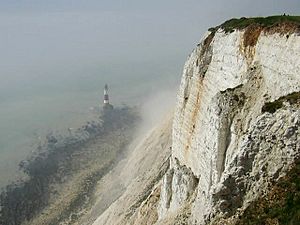Seaford to Beachy Head facts for kids
| Site of Special Scientific Interest | |
 |
|
| Area of Search | East Sussex |
|---|---|
| Interest | Biological Geological |
| Area | 1,108.7 hectares (2,740 acres) |
| Notification | 1999 |
| Location map | Magic Map |
Seaford to Beachy Head is a very special place in East Sussex, England. It stretches along the coast from Seaford to Eastbourne. This large area, about 1,108 hectares (that's like 2,700 football fields!), is known as a Site of Special Scientific Interest. This means it's a protected area because of its amazing nature and geology.
Scientists study this site because it has rare plants, animals, and very old rocks. Part of it is even a Local Nature Reserve, which is managed by the Sussex Wildlife Trust. This helps keep the area safe for all its unique features.
Contents
Seaford to Beachy Head: A Special Place
This coastal area is super important for both its living things (biology) and its rocks and landforms (geology). It's a national treasure because of the different types of natural homes it offers. These homes are called habitats.
Why is it Special?
The area has many different habitats. Each one supports unique plants and animals. These habitats include grassy areas, rocky shores, and tall cliffs.
Amazing Plants and Animals
You can find many different types of habitats here. These include:
- Chalk Grassland: Grassy areas on chalk hills.
- Maritime Grassland: Grasses that grow near the sea.
- Chalk Heath: Areas with small shrubs on chalk.
- Foreshore: The part of the coast between high and low tide.
- Chalk Cliffs: Tall, white cliffs made of chalk.
- River Meanders: Winding parts of rivers.
- Greensand Reef: An underwater ridge made of a type of rock called greensand.
Because of these varied habitats, the site is home to plants, insects (invertebrates), and birds that are rare in the rest of the country. It's a vital place for them to live and thrive.
Ancient Rocks and Fossils
The cliffs at Seaford to Beachy Head are like a giant history book made of rock. They show layers of chalk that formed about 80 million years ago. This was during a time called the Late Cretaceous period.
By studying these rock layers, scientists can learn a lot about what the Earth was like millions of years ago. They can find clues about ancient seas and the creatures that lived in them. This makes the site very important for understanding Earth's past.
Protecting This Area
Because Seaford to Beachy Head is so special, it has several important protections:
- It's a Site of Special Scientific Interest (SSSI).
- It includes several Geological Conservation Review sites. These are places that are very important for studying geology.
- Part of it is a Nature Conservation Review site, which means it's one of the most important places for nature in the country.
- A large part is also a Local Nature Reserve, managed by the Sussex Wildlife Trust. This group works to protect the wildlife and natural beauty of the area.
These protections help make sure that this amazing coastal area stays healthy and beautiful for future generations to enjoy and learn from.
 | Kyle Baker |
 | Joseph Yoakum |
 | Laura Wheeler Waring |
 | Henry Ossawa Tanner |

